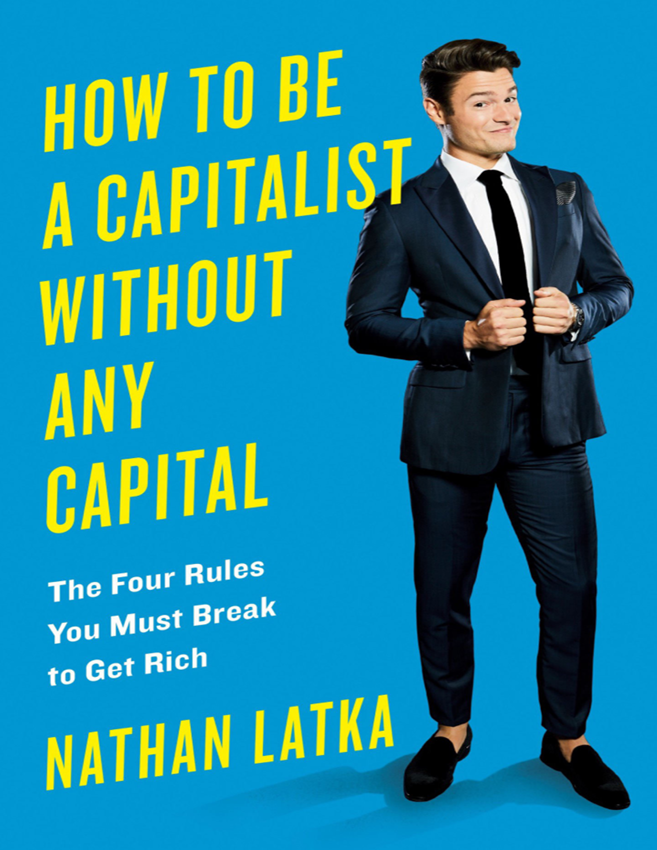
‘How to Be a Capitalist Without Any Capital’ by Nathan Latka is your helpful buddy who spills the beans about how you can pad out your pockets when there isn’t much in them already. But wealth is not always about quick-fix hits — it’s just as much about thinking outside the box and taking risks.Latka tells his story and gives you some insights into how he succeeded without a college degree. In this post, I wish to share with you what makes it such a great book, along with the value and learnings it can provide for aspiring business owners.
Not Sticking to Regular Rules
The book is centered on four rules, which, based on Latka’s experience, are 100% lies (true story)
1. Focus on One Thing
2. Copying is Bad
3. Improve Your Weaknesses
4. Work for Money
Latka believes that these sorts of regulations are designed to make sure no one gets rich for real. He instead suggests other tactics that have worked for him in accumulating his wealth.
Rule 1: Don’t Focus on One Thing
Latka challenges the conventional wisdom of not putting all of your eggs in one basket. He feels that having just one job or project is dangerous. He recommends dividing your efforts among a number of things. He juggled multiple projects and investments simultaneously, for instance. That way, if one thing doesn’t pan out, you still have most of your dominoes standing. This inevitably leads to advice like having multiple income streams, but if you want a better life and to achieve financial independence, it’s the true way, right? Well, not really.
Rule 2: Copying is Good
Despite ‘common wisdom’ that makes copying sound like a dirty word, Latka encourages replicating (not innovating) whatever works for someone else! He gives examples of studying successful businesses and tactics, then applying that same knowledge to reach goals. He claims this saves time and reduces potential failure.
Rule 3: Enhance Your Strengths, Not Fix Your Weaknesses
According to Latka, one should always focus on strengths rather than trying to improve weaknesses. He argues that you will gain much more by amplifying what makes you strong than by trying to be average at things where there is little chance for success. Enhanced focus on strengths leads to efficiency in work, ultimately leading to success.
Rule 4: Don’t Work for Money
The last rule Latka covers is not going out to work for money. One of the concepts he emphasizes is that one should build systems and businesses that keep rewarding them passively, rather than working by swapping time for money. According to Latka, you can gain financial freedom and live a larger life by creating businesses that are big and automated.
Strategies & Personal Story
The book uses a ton of personal stories and wise tricks to explain his ideas. For example, he tells how he bought a Rolls-Royce or some other fancy car for free because his negotiation skills were so good, and how he financed deals for companies with little money down.
The brutal honesty of Latka is what I find to be the most compelling feature that makes this book so interesting. He isn’t shy about sharing every detail, even going so far as to post emails from his ex-boss as well as financial papers to show that he’s telling the truth. Thus, his advice feels practical and honest — something to which readers can relate since they know exactly how he did it if they want to try out his ideas.
Strengths of the Book
Application Guidance: The book is replete with checklists and actions readers can take immediately. One of the best things about Latka is that he translates complex concepts into extremely easy-to-understand terms, making his book accessible for anyone new to entrepreneurship.
Life Experiences: Latka offers genuine life experiences and personal anecdotes that accompany his suggestions. These make the concepts easily understandable as they show practical applications in real business scenarios.
Inspirational and Motivational: Latka’s story is one of those success stories that can inspire or motivate people feeling discouraged due to a lack of money. From being a college dropout to becoming an affluent entrepreneur, his journey is the epitome of making it big with less.
Honest: The book is brutally honest. By sharing both his wins and losses, Latka provides a candid glimpse into the life of an entrepreneur.
Potential Drawbacks
Too Much Rule-Breaking: Doing something very differently can be a mantra for success, but not all conventional wisdom is wrong. The extent to which conventional wisdom is eschewed in *Rebel Ideas* might feel a bit much for some readers.
Need for Initiative and Creativity: The strategies in the book are very creative and require a tremendous amount of initiative. As Latka acknowledges by providing a map instead of turnkey answers, readers will likely need to do some legwork — but hopefully, they’ll at least have an idea where the scrap machines are buried.
